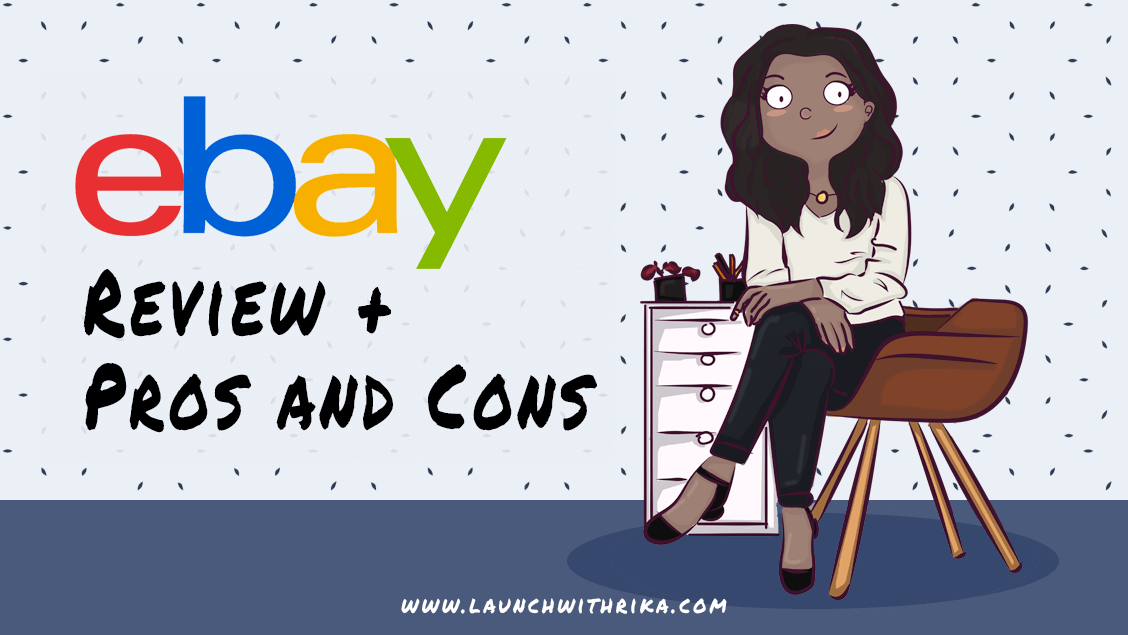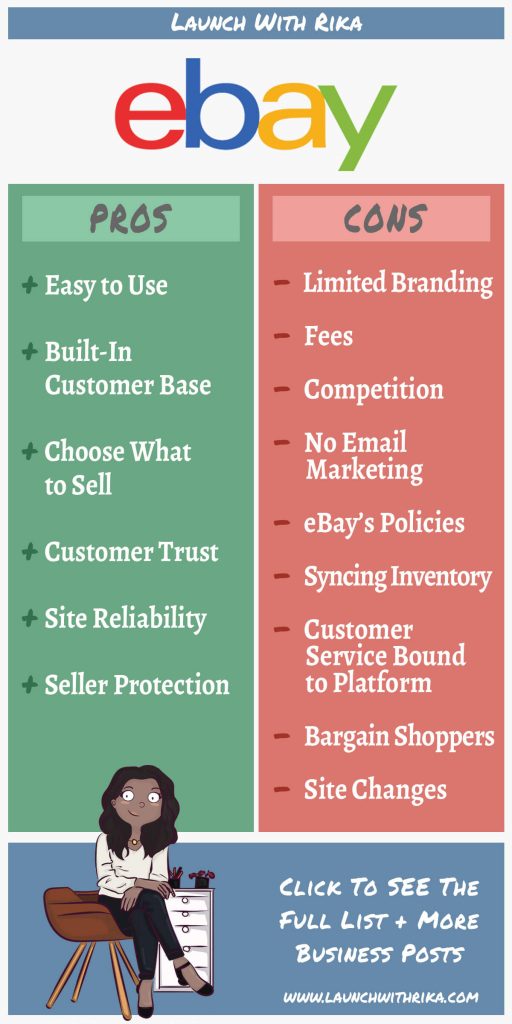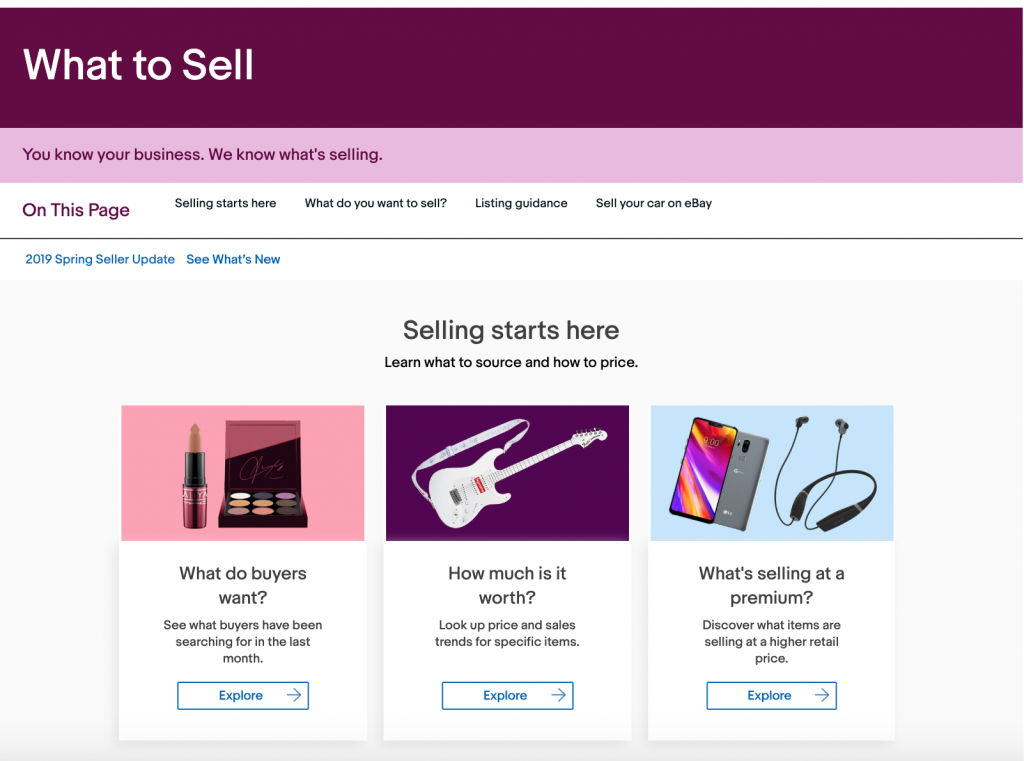eBay is a marketplace that supports consumer-to-consumer or business-to-consumer sales. You can find pretty much anything on eBay. Some products are offered at a fixed price while others are sold on an auction-based system. Even though eBay doesn’t have the most attractive look. there are some companies that are highly successful on eBay.

eBay is a third-party marketplace that connects independent sellers with buyers. Anyone can sign up with eBay and sell things they don’t need anymore or brand new products. Even though larger corporations started selling on eBay, most purchases are still consumer to consumer. eBay has a huge customer base and generates millions of transactions per day. You might’ve already sold something on eBay in the past but could this platform be the right sales channel for your business? In this article, you can find my eBay review and I’ll share my personal eBay pros and cons based on my experience using the platform.
eBay Pros and Cons Infographic
eBay Pros and Cons
eBay Pros
Easy to Use
Since eBay doesn’t only focus on big businesses, their interface is very straight forward. Creating an account and listing your product is easy and fast. You don’t need much technical knowledge to set up your eBay store.
Built-In Customer Base
A lot of people know eBay and have purchased from this marketplace before. Their large customer base is a great advantage for new sellers. It helps to get your product in front of many potential buyers. You don’t need to convince customers to visit your website. They’re already searching on eBay and might stumble across your product.
Choose What to Sell
eBay doesn’t have many restrictions on what you can list on their platform. You can sell almost anything, as long as it’s legal. Other marketplaces specialize in specific products or restrict certain product categories. If you found a new product or came up with a cool product idea, chances are there’s a user on eBay that would be interested in it.
Customer Trust
Many shoppers know and trust eBay. They most likely already made successful transactions on this platform before and use the platform confidently. eBay also provides a review system that helps customers to separate the good sellers from the bad.
Site Reliability
When you run your own website, it’s likely that your website will be down at some point. That’s just what happens when you work with other servers. eBay barely ever has this issue. This marketplace is basically never down and allows customers to shop all day and night.
Seller Protection
One reason why shoppers aren’t afraid to place orders on eBay is that eBay protects its buyers. If buyers don’t receive their orders or if a seller tries to mislead the customer, the buyer is protected. This protection however also extends to the seller. On eBay, you don’t need to be worried that you get scammed by fake buyers. The platform enforces seller protections that support its independent sellers.
eBay Cons
Limited Branding
It’s difficult to build and grow a brand on eBay. Shoppers are only looking for specific products and might not remember, who they actually bought from. You can create a shop page on eBay, but the branding opportunities are limited. eBay doesn’t allow you to completely tweak and customize your shop’s appearance or functions.
Fees
You’ll have to consider a couple of fees when you want to sell on eBay. eBay charges a monthly subscription fee. The lowest plan starts at $7.95/month or $4.95 if you choose the yearly plan. The listing fees depend on the category you want to list in, but most of the time it’s $0.35 per listing. You also get some free listings depending on your subscription. eBay charges a “Final Value Fee”, which is a cut of each product sold. For most categories, it’s 10% or 12%.
Competition
There are tons of products listed on eBay. This often pushes prices down if sellers want to be able to compete. For most categories, shoppers have a lot of choices, which makes it difficult to get your products in front of customers. This is especially true if you’re a new seller. eBay often prefers sellers with a good sales history and gives them priority in the search results. Establishing your new store can be difficult and will most likely take some time.
No Email Marketing
On eBay, your engagement with your customers pretty much ends when you shipped them their order. Based on eBay’s policy, you’re not allowed to contact your past customers with promotions. You’re also not allowed to drive traffic away from eBay and can’t send them a link to your website. This makes retaining customers and building relationships difficult.
eBay’s Policies

You need to remember that when you’re selling on eBay, you’re just renting space. This means that you’re not in full control. You need to follow eBay’s rules and policies. One example is that you can’t structure your own return policy. Usually, customers can send the product back if it’s not as described or damaged whether you agree to the claim or not.
Syncing Inventory
When you expand to other sales channels, you need to keep track of your inventory across all platforms. This can be time-consuming and exhausting. I’d suggest using inventory management software. Shopify, for example, integrates with eBay so you can keep your inventory up to date on both your website and eBay.
Customer Service Bound to Platform
As mentioned before, you’re not allowed to contact your customer off eBay. This means that you also have to respond to your customers via the eBay platform. Their messaging interface is in my opinion, not the sleekest and can make keeping track of customer service tickets cumbersome.
Bargain Shoppers
If you want to sell luxury or higher-priced items, eBay might not be the right platform for you. When eBay started, it was mostly an auction site so many shoppers associate eBay with low priced items. Surely, some shoppers don’t mind spending a bit more but many customers turn to eBay in hope to strike a bargain. eBay is aware of these characteristics and even dedicates a whole section to deals. If your product doesn’t have high margins or is on the higher price range, eBay might not be the best fit.
Site Changes
eBay is always changing and is implementing adjustments and improvements. The changes can range from the layout and design to the search algorithm. Having to adjust to changes can throw you off, especially when you just wanted to make a small edit to one of your listings.
Conclusion
Since eBay has a large existing customer base, eBay can be a great platform to expand your sales channels. Make sure to check if your product has high enough margins to allow a possible price decrease and how much competition there is on eBay. I recommend expanding to your own website sooner or later if you’re looking to build your own brand.
By the way, some other third-party marketplaces are Amazon and Etsy. To figure out if it’s worth it to sell on these platforms, I created an Amazon review and an Etsy review and shared my pros and cons.









